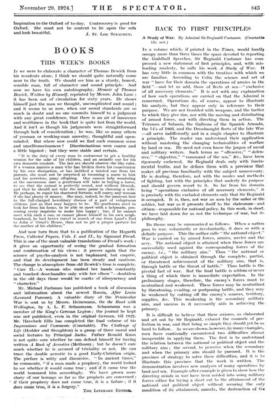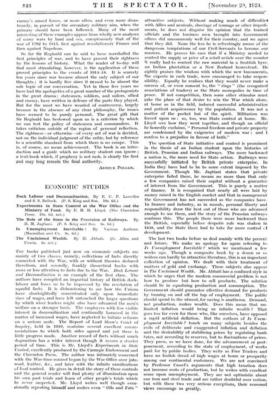BACK TO FIRST PRINCIPLES
IN a volume which, if printed in the Times, would hardly occupy more than three times the space devoted to reporting the Guildhall Speeches, Sir Reginald Custance has coin. pressed a new statement of first principles, and, with mis- leading modesty, he calls his work A Study of War. It has very little in common with the treatises with which we are familiar. According to Cohn the science and art' of war " have for their domain the operations of armies in the field "—and let us add, those of fleets at sea—" exclusive of all accessory elements." It is not with any explanation of how such operations are carried on that the Admiral is concerned. Operations do, of course, appear to illustrate his analysis, but they appear only in reference to their purpose. We are not troubled with wea',ons, and the tactics to which they give rise, nor with the moving and distributing of armed forces, nor with directing them in action. The Triremes of" Salamis, the Galleons of the Spanish Armada, the 74's of 1803, and"the Dreadnought fleets of the late War —all serve indifferently and in a single chapter to illustrate a principle. The reader can understand their application without mastering the changing technicalities of warfare by land or sea. He need not even know the jargon of naval and military writers. Such terms as " offensive," " defen- sive," " objective," "command of the sea," Sic., have been rigorously eschewed. Sir Reginald deals only with fUnda-- mental truths, and he defines them with a precision' that makes all previous familiarity with the subject unnecessary. He is dealing, therefore, not with the modes and methods of fighting, but with the principles that underly its purpose and should govern resort to it. So far from his domain being " operations exclusive of all accessory elements," it is precisely with the excluded elements only that Sir Reginald is occupied. It is, then, not war as seen by tlre4 sillier or- the soldier, but war as -it presents itself to the statesman—and citizen—responsible for national policy. In this work, in short, we have laid down for us not the technique of• war, but its philosophy.
Its theme may be summarized as follows. When a nation goes to war, voluntarily or involuntarily, it does so with a definite purpose. This the author calls " the national object." War is carried on by armed forces, armies, navies and the aery. The national object is attained when these forces are successfully used against the corresponding forces of the enemy, i.e., " the military aim." Thus " the national or political object is obtained through the complete, partial, or threatened achievement of the military aim, that is, through battle or the threat of battle." Thus battle is the pivotal fact of war. But the final battle is seldom or never a thing of which there is immediate expectation. In the preliminary stages, therefore, the enemy's forces must be neutralized and weakened. These forces may be neutralized by threatening, evading, or postponing battle, and they may be weakened by cutting off the enemy's sources, territory, supplies, &c. This weakening is the secondary military aim, and success in it necessarily aids in achieving the primary.
It is difficult to believe that these axioms, as elaborated and set out by Sir Reginald, exhaust the counsels of per- fection in war, and that being so simple they should yet.be so hard to follow. As we are shown, however, by many examples, men have continually encountered two difficulties almost insuperable in applying them. The first is to understand the relation between the national or political object and the military aim ; the second, to perceive when the• secondary and when the primary aim should be pursued. It is the province of strategy to solve these difficulties, and it is to illustrate this province that the work is written. The demonstration involves new analyses of many operations by land and sea. Example after example is given to show how the directing minds in war have been misled into using military forces either for trying a short cut to the attainment of the national and political object without securing the only condition of its attainment, namely, the destruction of the
enemy's armed forces, or more often, and even more disas- trously, in pursuit of the secondary military aim, when the primary should have been followed. Many of the most interesting of these examples appear from wholly new analyses of many wars by land and sea, conspicuously that of the war of 1792 to 1815, first against revolutionary France and then against Napoleon.
So far Sir Reginald can be said to have marshalled the first principles of war, and to have proved their rightness by the lessons of history. What the reader of to-day will find most stimulating, however, is the application of these proved principles to the events of 1914-18. It is scarcely ten years since war became almost the only subject of our thoughts ; it is hardly five since it ceased to be almost the sole topic of our conversation. Yet in those five years we have had the apologetics of a great number of the protagonists in the great drama ; statesmen, soldiers, and sailors, allied and enemy, have written in defenCe of the parts they played. But for the most we have wearied of controversy, largely because in the absence of any clear philosophy, the issues have seemed to be purely personal. The great gift that Sir Reginald has bestowed upon us is a criterion by which we can test the policy of statesmen and commanders. It takes criticism outside of the region of personal reflection. The rightness—or otherwise—of every act of war is decided, not on the individual judgment of the critic, but by reference to a scientific standard from which there is no escape. This is, of course, no mean achievement. The book is an intro- duction and a guide which no military student can ignore ; a text-book which, if prophecy is not rash, is clearly the first and may long remain the final authority.
ARTHUR POLLEN.



























































 Previous page
Previous page